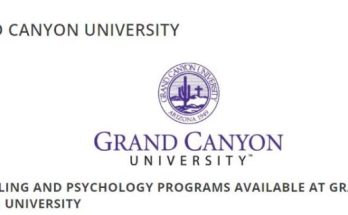Yes, Grand Canyon University is regionally accredited by the Higher Learning Commission (HLC) and has additional accreditations from various organizations such as the Accreditation Council for Business Schools and Programs (ACBSP) and the Commission on Accreditation of Athletic Training Education (CAATE). GCU takes pride in its high-quality academic programs and ensures that students receive a respected degree from an accredited institution.
With a focus on providing education that meets industry standards, GCU prioritizes its commitment to accreditation, both regionally and programmatically, to ensure that students receive a valuable and reputable education. Whether pursuing a degree in business, nursing, or any other field, students can be confident in the legitimacy and credibility of their degree from Grand Canyon University.
Understanding Regional Accreditation
If you are considering pursuing higher education at Grand Canyon University (GCU), it’s essential to understand the complexities of regional accreditation. This level of accreditation has a significant impact on the quality and recognition of your degree. In this blog post, we will delve into the importance of regional accreditation and its implications for your academic journey at GCU.
What Is Regional Accreditation?
Regional accreditation is a rigorous quality assurance process conducted by accrediting bodies in specific geographic regions of the United States. In the case of GCU, it is regionally accredited by the Higher Learning Commission (HLC), one of the six regional accreditation agencies recognized by the U.S. Department of Education.
Importance Of Regional Accreditation
Regional accreditation holds utmost importance as it ensures that institutions like GCU comply with high academic standards, ethical practices, and continuous improvement. It also signifies that the degrees and credits earned at GCU are recognized and respected by other regionally accredited institutions and employers nationwide. This accreditation can affect aspects such as transferability of credits, eligibility for financial aid, and admission to graduate programs.
Grand Canyon University’s Accreditation
When it comes to choosing a university, accreditation is a crucial factor to consider. Accreditation ensures that the institution meets specific academic standards, and it is a mark of quality education. But is Grand Canyon University regionally accredited? Let’s delve into the details.
Grand Canyon University holds accreditation from various accrediting agencies that validate the quality of its programs. These agencies evaluate the institution’s curriculum, faculty qualifications, and facilities to ensure that students receive a well-rounded education.
Considered the most prestigious type of accreditation, regional accreditation is granted by accrediting agencies specific to a geographic region. Grand Canyon University is regionally accredited by the Higher Learning Commission (HLC), one of the leading accrediting bodies in the United States.
In addition to regional accreditation, Grand Canyon University also holds programmatic accreditations in several disciplines. These programmatic accreditations ensure that specific programs meet industry standards and produce qualified professionals. GCU has accreditations from prestigious organizations such as the Accreditation Council for Business Schools and Programs (ACBSP) and the Commission on Accreditation of Athletic Training Education (CAATE).
In conclusion, Grand Canyon University is not only regionally accredited but also holds programmatic accreditations in various fields. These accreditations reflect the university’s commitment to providing high-quality education and preparing students for successful careers in their chosen fields.
Comparison With National Accreditation
When it comes to choosing the right educational institution, accreditation is an essential factor to consider. It ensures that the institution meets specific quality standards and that the degrees and programs offered are recognized and valued by employers and other educational institutions.
Difference Between Regional And National Accreditation
There are two main types of accreditation: regional and national. Regional accreditation is considered the most prestigious and widely-recognized type of accreditation. Schools with regional accreditation are reviewed by their designated regional agency to ensure they meet rigorous academic standards and provide quality education.
On the other hand, national accreditation agencies review institutions of a similar type, such as career, vocational, and technical schools. While these institutions may also provide quality education, national accreditation may not hold the same level of recognition or transferability as regional accreditation.
Benefits Of Regional Accreditation
Regional accreditation offers several benefits to students and institutions alike. Here are some key advantages:
- Recognition and credibility: Regional accreditation is widely recognized and respected, providing assurance that the institution meets high academic standards.
- Transferability of credits: Credits earned at a regionally accredited institution are more likely to be accepted by other colleges and universities, making it easier for students to transfer or pursue further education.
- Career opportunities: Many employers prefer candidates with degrees from regionally accredited institutions, as it signifies a higher level of education and quality.
- Financial aid eligibility: Regional accreditation is often a requirement for students to be eligible for federal financial aid programs, grants, and scholarships.
In conclusion, Grand Canyon University is regionally accredited by the Higher Learning Commission (HLC), which is one of the six regional accrediting bodies recognized by the U.S. Department of Education. This accreditation ensures that the university meets rigorous academic standards and provides quality education to its students.
Therefore, if you are considering Grand Canyon University for your educational journey, you can be confident in the institution’s credibility, recognition, and the potential opportunities it can provide.
Perceptions And Concerns
Grand Canyon University is regionally accredited by the Higher Learning Commission (HLC) and holds additional accreditations from the Accreditation Council for Business Schools and Programs (ACBSP), the Arizona State Board of Education, and the Commission on Accreditation of Athletic Training Education (CAATE).
Public Perception Of Grand Canyon University’s Accreditation
Grand Canyon University (GCU) has been a subject of public discussions regarding its accreditation. GCU’s accreditation has faced scrutiny and various perceptions. Some critics have raised concerns about the legitimacy and quality of education offered by the university due to its for-profit status and expeditious growth. However, it is essential to note that GCU is regionally accredited by the Higher Learning Commission (HLC), a widely recognized and respected accrediting body.
Discussion On Diploma Mill Accusations
Diploma mill accusations are a common concern associated with for-profit institutions. However, it is worth highlighting that GCU is a regionally accredited university and not a diploma mill. The university’s accreditation from the HLC and additional accreditations from entities such as the Accreditation Council for Business Schools and Programs (ACBSP) and the Commission on Accreditation of Athletic Training Education (CAATE) attest to the quality of education provided.
Frequently Asked Questions Of Is Grand Canyon University Regionally Accredited?
Is Grand Canyon Nationally Accredited?
Yes, Grand Canyon University is nationally accredited by the Higher Learning Commission (HLC) and holds additional accreditations from other organizations.
Is A Degree From GCU Respected?
Yes, a degree from GCU is respected and regionally accredited by the Higher Learning Commission (HLC) and holds additional accreditations from relevant bodies.
What Is The Difference Between Regional And National Accreditation?
Regional accreditation is considered the most prestigious. It is reviewed by designated regional agencies. National accreditation is for schools of a similar type, like vocational or technical schools.
What Is GCU Ranked Nationally?
Grand Canyon University is regionally accredited by the Higher Learning Commission (HLC) and holds additional accreditations from other organizations.
Conclusion
Grand Canyon University is recognized for its regional accreditation by the Higher Learning Commission (HLC) and additional accreditations from the ACBSP, ASBE, and CAATE, ensuring the credibility of its programs. With a commitment to excellence, GCU stands as a reputable choice for quality education.



